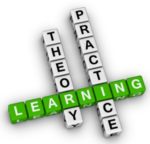 Having participated in teaching biology at a new place, I’ve completed a fresh run as an observer and found myself thinking a lot about introductory biology teaching decisions (the Bob Seger song “Against the Wind” has one of my favorite lines: “Deadlines and commitments/what to leave in… what to leave out.”). It occurred to me that there are two largely separable ways of teaching Introductory Biology that are quite different depending on what we want our students to be able to do. I believe the distinctions are not vastly unlike architects vs. engineers, or theoretical vs. applied physicists. It comes down to whether we want to be exposing our students to the how and why or the how-to and when-to. I’m almost exclusively in the former camp… but if we’re training medical students and technicians for industry, how much of ‘how does this work’ is needed? On the other hand, if we’re trying to attract and prepare P.I. (principal investigator)-level individuals and teach all comers ‘how life works’ alongside the wonders of what has evolved (and how), perhaps I can justify my approach.
Having participated in teaching biology at a new place, I’ve completed a fresh run as an observer and found myself thinking a lot about introductory biology teaching decisions (the Bob Seger song “Against the Wind” has one of my favorite lines: “Deadlines and commitments/what to leave in… what to leave out.”). It occurred to me that there are two largely separable ways of teaching Introductory Biology that are quite different depending on what we want our students to be able to do. I believe the distinctions are not vastly unlike architects vs. engineers, or theoretical vs. applied physicists. It comes down to whether we want to be exposing our students to the how and why or the how-to and when-to. I’m almost exclusively in the former camp… but if we’re training medical students and technicians for industry, how much of ‘how does this work’ is needed? On the other hand, if we’re trying to attract and prepare P.I. (principal investigator)-level individuals and teach all comers ‘how life works’ alongside the wonders of what has evolved (and how), perhaps I can justify my approach.
While I’m spouting popular culture quotes (from now and centuries ago): “Who does the Grail serve?”. There are a lot of important questions that we (and students) should address in embarking on an Intro Bio course. One is “Why are we doing this together?”.The ‘local answer’: this course serves the next course. I find this answer troubling; I don’ think this is a model of how anyone who has ‘arrived’ works, and I don’t think it’s supported by modern thinking and evidence in how learning effectively takes place. Everything about “put it into practice immediately” and “reveal the relevance of what you are learning” militates against promising “Memorize for now; one day you’ll thank me!”. A related form is “you don’t need to understand”: you just need to be able to pass the MCAT/GRE; you just need to sound good in an interview; you just need to get the right answer, not understand how you got there.” I think if we go down this path, we’re dancing on very thin ice separating providing an education vs. providing the APPEARANCE of one. The crux, as I see it, is what are we preparing these students for. If ‘only’ to be technicians in a lab, or “visiting scientists” en route to medical degrees (ones without significant research futures), then perhaps large volumes of “what” without the “how” and “why” is indeed appropriate. On the other hand, if I feel like we’re failing to serve the entire researcher class if we fail to convey real understandings and their origins. If we just want someone to lecture on life’s answers, just-the-facts is fine. If we’re preparing someone to discover these answers, we need a deeper and more flexible understanding.
tl;dr: In my view, we need to be (and ought to be) preparing theoretical/thinking biologists in some tracks as well as ‘just’ experimental ones
The hallmarks
I’ve accumulated a set of ‘signposts’ that I believe distinguish between “understanding based” vs. “operator based” approaches to biology (and likely anything else). To me, there are keywords whose appearance in discussion and assessment indicate which path we are walking:
- Explain vs. Describe. This one is straightforward when it appears this way; obviously ‘explain’ is about understanding (assuming that there is an implicit requirement of “create an explanation” rather than “regurgitate mine/the text’s”)
- What is the word for vs. what does it do, how, and to what purpose? This is perhaps the most common ‘crime’ of examination in my experience. Questions such as “Name 5 proteins at the replication fork” or “What are the stages of meiosis” require students to reproduce symbols and sounds without any actual involvement of meaning. I’ve suggested critical test is to look at every question on an exam and see if the question can be replaced by “What is the name of”. If it can, we’re asking about the LABEL, not the role, purpose, or mechanism
- Techniques vs. design and conclusions. In discussing experiments, we need to carefully delineate what it is that we want students to understand. Sure, we all agree that we want ‘the big idea’, but when the rubber hits the road, what must they study/memorize to succeed on an exam? If just the names of the experimenters, order of steps of protocol, or which outcome caused which conclusion, we are capturing the FORM of the thing and abandoning the reason.
Big Ideas vs. breadth of exposure
As with everything in IntroBIo, all things come with a cost. Memorizable content can be doled out in great quantities, and today’s college students will return impressive (apparent) ‘learning’ milestones if we’re not careful to make distinctions. But we all know how the term “short term” manifests once summer break hits. Just who have we served when we serve up only words?
